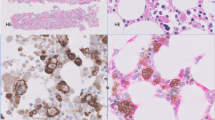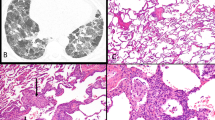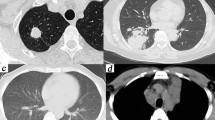Abstract
ACUTE pulmonary œdema occurs in pertussis inoculated mice injected with rabbit antisera to various mouse tumours1. The rabbit antibodies to mouse tumour antigens likely react with antigens present in mouse alveolar capillary endothelium to initiate a sequence of events leading to pulmonary œdema. Sections of œdematous lungs reveal a necrotizing alveolitis with a hyaline-like material lining the alveolar spaces.
This is a preview of subscription content, access via your institution
Access options
Subscribe to this journal
Receive 51 print issues and online access
$199.00 per year
only $3.90 per issue
Buy this article
- Purchase on Springer Link
- Instant access to full article PDF
Prices may be subject to local taxes which are calculated during checkout
Similar content being viewed by others
References
Kind, L. S., Burkhalter, A., and Sherins, R., Proc. Soc. Exp. Biol. Med., 108, 735 (1961).
Kind, L. S., Bact. Rev., 22, 173 (1958).
Grabar, P., and Burtin, P., Analyse Immunoelectrophoretique (Masson and Cie, Paris, 1960).
Swahn, B., Scand. J. Clin. and Lab. Invest., 5, Supp. 9, 1 (1953).
Anfisen, C. B., and Redfield, R. R., Advances in Protein Chemistry, 11, 64 (1956).
Author information
Authors and Affiliations
Rights and permissions
About this article
Cite this article
KIND, L., SMITH, A. & ELLMAN, P. Absence of Lipoprotein in Pulmonary Œdema Fluid produced by Cytotoxic Antibody. Nature 201, 1237–1238 (1964). https://doi.org/10.1038/2011237a0
Issue Date:
DOI: https://doi.org/10.1038/2011237a0
Comments
By submitting a comment you agree to abide by our Terms and Community Guidelines. If you find something abusive or that does not comply with our terms or guidelines please flag it as inappropriate.



